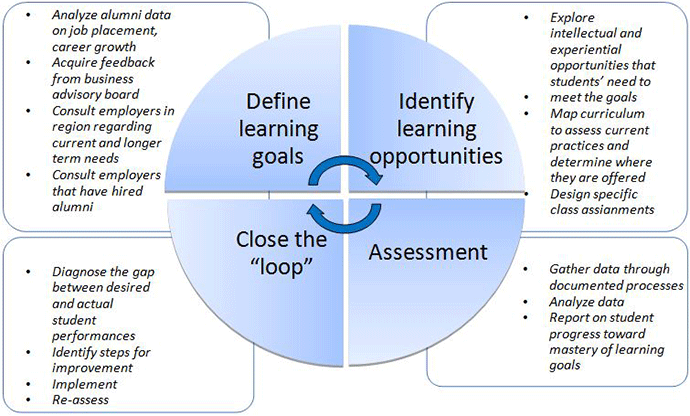Assurance of Learning
- More Assurance of Learning
According to AACSB (Association to Advance Collegiate Schools of Business):
Assurance of learning refers to processes for demonstrating that students achieve learning expectations for the programs in which they participate. Schools use assurance of learning to demonstrate accountability and assure external constituents such as potential students, trustees, public officials, supporters, and accrediting organizations that the school meets its goals. Assurance of learning also assists the school and faculty members to improve programs and courses. By measuring learning, the school can evaluate its students' success at achieving learning goals, use the measures to plan improvement efforts, and (depending on the type of measures) provide feedback and guidance for individual students. For assurance of learning purposes, AACSB accreditation is concerned with broad, program-level focused learning goals for each degree program, rather than detailed learning goals by course or topic, which must be the responsibility of individual faculty members.
Assurance of learning refers to the processes through which the Koppelman School of Business demonstrates:
- the currency of our programs,
- engagement by faculty in the academic development of our students, and
- accountability to our stakeholders.
Our Assurance of Learning Cycle is captured in the following diagram:
The Assurance of Learning Cycle

Student Learning Goals
Koppelman School of Business faculty members have agreed on the following learning goals for our students:
Written Communication
Our students will be able to write effectively using appropriate language and business conventions in order to be understood in the business environment.
Critical Thinking
Our students will be able to identify issues and problems, gather and interpret relevant data, evaluate assumptions, develop informed solutions and conclusions, and articulate consequences of proposed actions.
Information Literacy
Related to critical thinking, our students will be able to collect, analyze, synthesize and present data. They will demonstrate ethical conduct related to the use of data.
Ethical Awareness, Sensitivity and Managerial Competency
Our students will recognize ethical dilemmas, respond sensitively to parties involved, and translate ethical considerations into appropriate managerial action.
Quantitative Reasoning
Our students will have the ability to identify, apply, and utilize mathematical and statistical concepts, techniques, and tools to derive meaningful conclusions based on an analysis.






